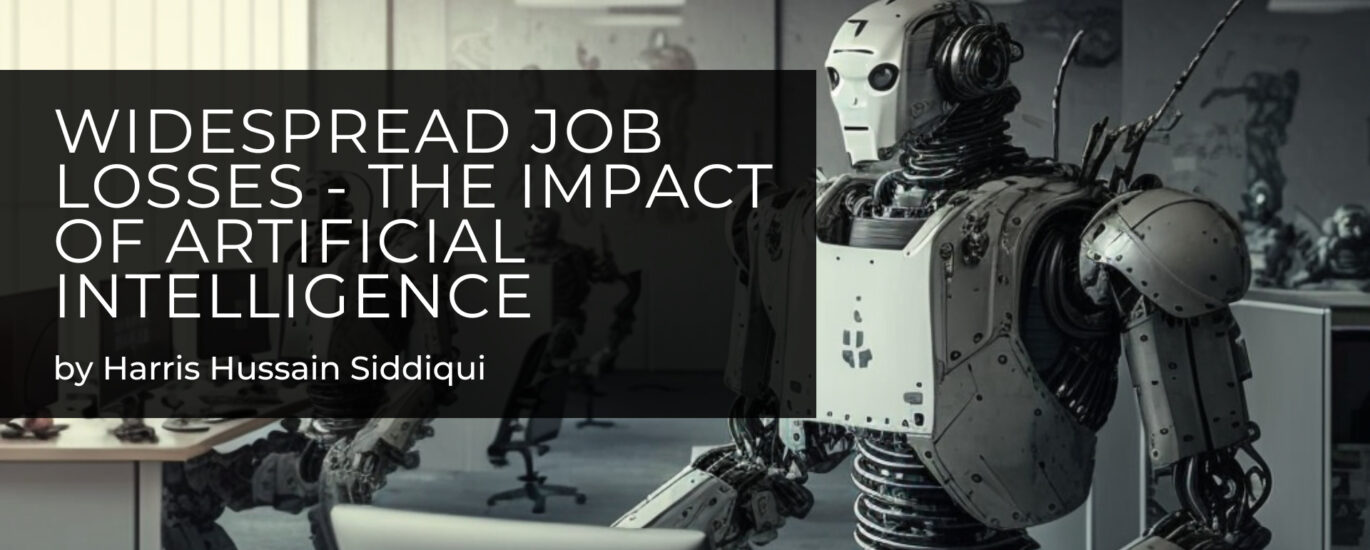


Artificial Intelligence (AI) has been a hot topic for several years now and its impact on various industries and aspects of our lives has been widely discussed. One of the key concerns that has come to the forefront is the impact of AI on employment. The fear of widespread job losses due to automation and the increasing use of AI in various industries has been a matter of great concern, especially in the wake of the COVID-19 pandemic, which has already led to significant job losses globally.
AI has the potential to automate a wide range of jobs, from manual labor to white-collar jobs. The rise of AI-powered robots and automation technology has led to a decrease in the demand for labor, leading to job losses in various industries. For example, the manufacturing industry, which was once the backbone of many economies, has seen a significant decrease in the number of workers needed due to the introduction of robots and automation technology.
The service sector, which employs a large number of people, is also not immune to the impact of AI. AI-powered virtual assistants, chatbots, and self-service kiosks have already started replacing customer service jobs, and this trend is expected to continue. Furthermore, the increasing use of AI in the financial sector has led to a decrease in the number of jobs in areas such as loan processing and insurance claims management. Here is the comprehensive list of impacts jobs:
Job Title | Explanation |
| Data Entry Clerk | Repetitive data entry tasks can be automated using AI systems, reducing the need for human data entry clerks. |
| Telemarketing/Call Center Agent | AI technology, such as chatbots, can handle routine customer service inquiries, freeing up human workers to handle more complex tasks. |
| Manufacturing Worker | Robotics and AI are increasingly being used in manufacturing, with machines performing tasks such as assembly and packaging. |
| Retail Sales Associate | AI systems and automation technologies, such as self-checkout machines, are being used to streamline the shopping experience, reducing the need for human sales associates in some cases. |
| Bookkeeper | AI systems can perform routine bookkeeping tasks, such as invoicing and account reconciliation, more accurately and efficiently than humans. |
| Customer Service Representative | AI-powered virtual assistants can handle routine customer service inquiries, freeing up human customer service representatives to handle more complex tasks. |
| Transcriptionist | AI-powered speech recognition technology can transcribe audio recordings more accurately and efficiently than human transcriptionists. |
| Logistics Coordinator | AI and automation technologies are being used to optimize logistics and supply chain management, potentially reducing the need for human logistics coordinators. |
| Delivery Driver | Self-driving vehicles and drones equipped with AI and automation technologies have the potential to reduce the need for human delivery drivers in certain circumstances. |
| Bank Teller | Automated teller machines (ATMs) and online banking systems have reduced the need for human bank tellers in many instances. |
| Lawyer | AI-powered legal research systems and contract analysis software have the potential to assist lawyers with routine tasks, freeing up their time to focus on more complex tasks. |
| Journalist | AI-powered news aggregators and news writing systems have the potential to assist journalists with routine tasks, such as data gathering and article summarization, freeing up their time to focus on more complex tasks. |
| Surgeon | Robotics and AI are being developed to assist with routine surgical tasks, such as suturing and tissue removal, freeing up human surgeons to focus on more complex tasks. |
| Software Developer | AI systems are being developed to assist with routine software development tasks, such as code generation and testing, freeing up human software developers to focus on more complex tasks. |
| Content Writer | AI-powered tools can assist with routine writing tasks, such as generating content for websites and social media, freeing up human content writers to focus on more creative writing tasks. |
| Musician | AI-powered systems are being developed to assist with tasks such as composing and arranging music, freeing up human musicians to focus on more creative tasks. |
| HR Manager | AI-powered systems are being developed to assist with routine HR tasks, such as resume screening and employee scheduling, freeing up human HR managers to focus on more strategic tasks. |
| Digital Marketing | AI-powered systems can assist with tasks such as ad targeting and optimization, freeing up human digital marketers to focus on more creative and strategic tasks. |
| Graphics Designer | AI systems are being developed to assist with routine graphics design tasks, such as image manipulation and creation of basic designs. This can free up human graphics designers to focus on more complex and creative tasks. |
While the impact of AI on employment is a cause for concern, it is also important to recognize that AI has the potential to create new job opportunities as well. For example, the development and implementation of AI systems and technology requires specialized skills and knowledge, leading to the creation of new jobs in areas such as AI programming, data analysis, and cybersecurity.
In conclusion, the impact of AI on employment is a double-edged sword. On the one hand, it has the potential to automate many jobs, leading to widespread job losses. On the other hand, it also has the potential to create new job opportunities in areas such as AI development and implementation. To ensure that the impact of AI on employment is positive, it is important for governments, businesses, and educational institutions to work together to provide the necessary training and education for workers to acquire the skills and knowledge required for the jobs of the future.